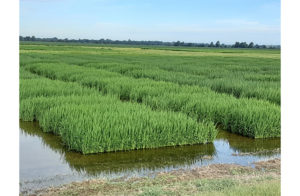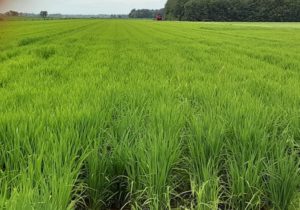 The latest developments in rice variety development, weed management and furrow irrigation will be highlighted by Southeast Missouri State University and University of Missouri faculty at the Missouri Rice Research and Merchandising Councils (MRC) annual Rice Field Day Aug. 20.This years event will take place virtually due to the COVID-19 pandemic, and researchers have prepared a series of online presentations that focus on research being conducted across southeastern Missouri.Rice Field Day, which will be hosted on missouririce.com, is a chance for the rice producers of Missouri and their colleagues in Arkansas, Mississippi, Louisiana and Texas to collaborate using science and technology to provide new rice varieties, said Dr. Michael Aide, Southeast soil scientist.It is also a chance for rice producers to improve technologies that maintain an abundant supply of low-cost and high nutritious rice for American consumers and foreign markets, he said.Emerging technologies include real-time crop monitoring using unmanned aerial vehicles to rapidly detect plant stress, water management, weed management, soil fertility and market conditions, Aide said. Missouri rice is a $250 million investment in the most southern portion of Missouri which, in turn, supports our local schools, roads and other infrastructures.Topics to be addressed during the virtual field day are row rice and remote sensing, rice variety development and potential long grain lines at the first stage of multi-location field testing, furrow irrigated bed widths, nitrogen fertilization for furrow irrigated rice, and complete residual grass control in rice.Aide will discuss the benefits and potential issues associated with furrow irrigated rice, or row rice, which is an increasing practice among producers of Missouri and Arkansas. There are several advantages to row rice including reduce water pumping and field preparation costs, reduced labor, and reduced energy usage, he said.Row rice shows great promise; many producers are very happy with it, Aide said.
The latest developments in rice variety development, weed management and furrow irrigation will be highlighted by Southeast Missouri State University and University of Missouri faculty at the Missouri Rice Research and Merchandising Councils (MRC) annual Rice Field Day Aug. 20.This years event will take place virtually due to the COVID-19 pandemic, and researchers have prepared a series of online presentations that focus on research being conducted across southeastern Missouri.Rice Field Day, which will be hosted on missouririce.com, is a chance for the rice producers of Missouri and their colleagues in Arkansas, Mississippi, Louisiana and Texas to collaborate using science and technology to provide new rice varieties, said Dr. Michael Aide, Southeast soil scientist.It is also a chance for rice producers to improve technologies that maintain an abundant supply of low-cost and high nutritious rice for American consumers and foreign markets, he said.Emerging technologies include real-time crop monitoring using unmanned aerial vehicles to rapidly detect plant stress, water management, weed management, soil fertility and market conditions, Aide said. Missouri rice is a $250 million investment in the most southern portion of Missouri which, in turn, supports our local schools, roads and other infrastructures.Topics to be addressed during the virtual field day are row rice and remote sensing, rice variety development and potential long grain lines at the first stage of multi-location field testing, furrow irrigated bed widths, nitrogen fertilization for furrow irrigated rice, and complete residual grass control in rice.Aide will discuss the benefits and potential issues associated with furrow irrigated rice, or row rice, which is an increasing practice among producers of Missouri and Arkansas. There are several advantages to row rice including reduce water pumping and field preparation costs, reduced labor, and reduced energy usage, he said.Row rice shows great promise; many producers are very happy with it, Aide said. Southeast rice breeder Dr. Christian De Guzman will discuss rice variety development and the potential long grain lines at the first stage of multi-location field testing trials which are being conducted in the Missouri communities of Fisk, Morehouse, Campbell and Neelyville.De Guzmans presentation will also include information about rice breeding for abiotic stress tolerance specifically heat, aerobic germination and seedling flood tolerance.After extreme heat caused Missouri rice yields to decline several years ago, De Guzman began developing a heat-tolerant variety capable of producing significant yield that will be available soon. In all the lines tested, De Guzman said the effects of heat reduce yields, or spikelet fertility, by about 20%.Anaerobic germination and seedling flood tolerance trials are being tested now in Southeasts greenhouse, De Guzman said, in response to the problems breeders encounter when newly planted lines see too much rain right away.Field trials will begin once researchers have collected enough data from these tests, he said.Along with Aide and De Guzman in Southeasts Department of Agriculture, Rice Field Day speakers will include Johanna Nelson, research specialist with the University of Missouri; Dr. Gene Stevens, agronomy extension professor with the University of Missouri Fisher Delta Research Center; Dr. David Reinbott, agriculture business program with the University of Missouri Extension, Southeast Region; and Dr. James Heiser, senior research associate with the University of Missouri Fisher Delta Research Center. Videos from the Aug. 20 event will be available at missouririce.com.The Missouri Rice Council hosts the annual Missouri Rice Field Day with support from Southeast Missouri State University and the University of Missouri Fisher Delta Research Center. In 2021, organizers plan to resume Rice Field Day in a face-to-face format to showcase the latest technologies and get feedback from rice producers in person, Aide said.For more information, visit missouririce.com.
Southeast rice breeder Dr. Christian De Guzman will discuss rice variety development and the potential long grain lines at the first stage of multi-location field testing trials which are being conducted in the Missouri communities of Fisk, Morehouse, Campbell and Neelyville.De Guzmans presentation will also include information about rice breeding for abiotic stress tolerance specifically heat, aerobic germination and seedling flood tolerance.After extreme heat caused Missouri rice yields to decline several years ago, De Guzman began developing a heat-tolerant variety capable of producing significant yield that will be available soon. In all the lines tested, De Guzman said the effects of heat reduce yields, or spikelet fertility, by about 20%.Anaerobic germination and seedling flood tolerance trials are being tested now in Southeasts greenhouse, De Guzman said, in response to the problems breeders encounter when newly planted lines see too much rain right away.Field trials will begin once researchers have collected enough data from these tests, he said.Along with Aide and De Guzman in Southeasts Department of Agriculture, Rice Field Day speakers will include Johanna Nelson, research specialist with the University of Missouri; Dr. Gene Stevens, agronomy extension professor with the University of Missouri Fisher Delta Research Center; Dr. David Reinbott, agriculture business program with the University of Missouri Extension, Southeast Region; and Dr. James Heiser, senior research associate with the University of Missouri Fisher Delta Research Center. Videos from the Aug. 20 event will be available at missouririce.com.The Missouri Rice Council hosts the annual Missouri Rice Field Day with support from Southeast Missouri State University and the University of Missouri Fisher Delta Research Center. In 2021, organizers plan to resume Rice Field Day in a face-to-face format to showcase the latest technologies and get feedback from rice producers in person, Aide said.For more information, visit missouririce.com.